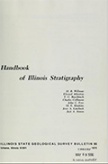Historical:Cheltenham Clay Member
Lithostratigraphy: Kewanee Group >>Spoon Formation >>Cheltenham Clay Member
Chronostratigraphy: Paleozoic Erathem >>Pennsylvanian Subsystem >>Desmoinesian Series
Allostratigraphy: Absaroka Sequence
Authors
M. E. Hopkins and J. A. Simon
Name Origin
The Cheltenham Clay Member of the Spoon Formation (Wheeler, 1896, p. 247; White, 1909, p. 293) is named for the Cheltenham district in the southern part of St. Louis, Missouri. In Illinois, the name is applied locally to a complex claystone member that results from the thinning out of many units and the merging of several underclay units.
Correlation
The Cheltenham Clay Member in Illinois is considered to be part of the Desmoinesian Series, but in Missouri similar deposits (Cheltenham Formation) are considered part of the Atokan Series (Howe and Koenig, 1961).
Extent and Thickness
The Cheltenham is developed primarily in northern, western, and southwestern Illinois, areas where the Pennsylvanian section below the Colchester Coal is relatively thin.
Stratigraphic Position
The stratigraphic interval occupied by this member varies. The youngest deposits are at or immediately below the underclay of the Colchester (No. 2) Coal and the oldest are near the base of the underclay below the Brush (New Burnside) Coal.
References
HOWE, W. B., and J . W. KOENIG, 1961, Stratigraphic succession in Missouri: Missouri Geological Survey, v. 40, 185 p.
WHEELER, H. A., 1896, Clay deposits: Missouri Geological Survey, v. 11, 1st Series, 622 p.
WHITE, DAVID, 1909, Paleobotanical work in Illinois in 1908: Illinois State Geological Survey Bulletin 14, p. 293-295.
ISGS Codes
| Stratigraphic Code | Geo Unit Designation |
|---|---|
